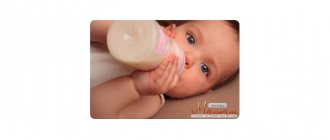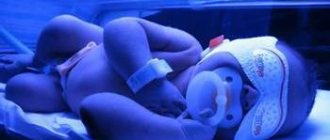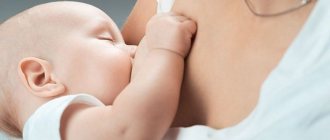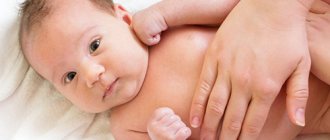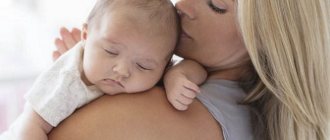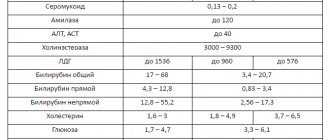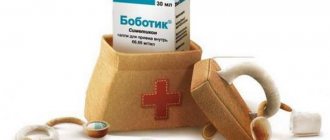Since hiccups usually bother adults, many people find that they also bother babies. However, children usually do not experience discomfort. In fact, many newborns can sleep through bouts of hiccups without being disturbed, and the hiccups rarely impede or have any effect on the baby's breathing.
Most hiccup episodes last from a few minutes to an hour. In any case, there is nothing to worry about. In fact, many babies find hiccups quite funny. Hiccups in a baby are normal body reflexes and parents should not worry at all.
Why does the child hiccup?
The baby hiccups even in the womb, from the second trimester. When a woman is pregnant, sometimes she feels that the baby's body is pulsating rhythmically. Perhaps at this moment the fetus has hiccups.
So why does a baby hiccup while still in the womb?:
- the brain sends a signal to the fetus's diaphragm to contract, and when it contracts, the fetus sucks in amniotic fluid, which causes hiccups;
- Fetal hiccups also occur when the baby develops a sucking reflex and thus sucks in amniotic fluid;
- Rarely, a significant increase in hiccups may be a sign that the umbilical cord is wrapped around the fetus's neck and restricting the flow of oxygen, known as cord compression.
You don't have to worry too much about this. But if anxiety increases, tell your doctor and he will order an ultrasound to check if everything is normal.
Common causes of hiccups in newborns:
- Immature diaphragm. A newborn often hiccups when its immature diaphragm contracts suddenly and irregularly. As the baby grows, the contractions of the diaphragm, along with the muscles between the ribs and abdomen, become more synchronized and stronger, which gradually reduces the frequency and severity of hiccup episodes.
- Overfeeding. This is one of the common reasons why a baby hiccups after feeding. Rapid distension of the stomach or its fullness can provoke a spasm of the diaphragm muscle, which will lead to hiccups.
- Swallowing air. This is another reason why babies hiccup. Most babies tend to swallow a lot of air when feeding, which can also lead to hiccups. The occurrence of hiccups in an infant also depends on the position in which the baby is fed and other factors, such as whether you allow the baby to burp frequently during feeding to reduce the amount of air swallowed.
- Decrease in temperature. Hiccups can also occur if your body temperature suddenly drops. Since a newborn baby is less able to maintain his body temperature, any significant changes in the environment can significantly affect his body temperature. Therefore, it is recommended to keep children warm and comfortable.
- Mother's diet. The baby often hiccups due to the mother's diet. No matter what the mother drinks or eats, the nutrients consumed are passed on to the baby through breast milk. Newborns are more likely to experience hiccups after feeding if the mother consumes peanuts, eggs, wheat, caffeine, chocolate, citrus fruits and soy products before feeding the baby. For best results, avoid foods that may cause your baby to hiccup for at least an hour before feeding.
- Acid reflux. Regular hiccups, even when the baby is not overfed or swallowed air, can signal a possible underlying problem. Gastroesophageal reflux disease (known as GERD) is a condition in which some stomach contents regurgitate into the esophagus. This may cause pain and hiccups. However, hiccups are not usually the only symptom of GERD. Other indicators that a baby may experience include colicky behavior, pain-related behavior, fussiness at night, frequent regurgitation, and abdominal pain after breastfeeding. If your baby hiccups frequently or has any other symptoms associated with GERD after making feeding changes, talk to a specialist about the problem.
- Allergy. The baby may be allergic to certain proteins found in formula or even breast milk, which in turn causes inflammation of the esophagus called eosinophilic esophagitis. As a reaction to the condition, the diaphragm spasms, causing hiccups.
- Irritants in the air. Babies have a sensitive respiratory system, and any airborne irritant, such as fumes, pollution, or intense aroma, can trigger a cough. Repeated coughing puts pressure on the diaphragm, causing it to vibrate. This may be the reason why your baby hiccups.
Hiccups and vomiting in children
Mothers often notice that the baby hiccups after feeding and then spits up profusely. This may cause concern for parents. You might think that the child threw up everything and is now hungry, but in most cases the child simply ate too much, as a result of which the stomach began to put pressure on the diaphragm, which became a consequence of hiccups. After burping, the baby gets rid of the excess and the hiccups go away on their own.
Hiccups and vomiting may indicate problems with the stomach, but in combination with other symptoms, and also if the baby spits up very profusely and this happens too often. In most cases, burping helps stop hiccups in newborns.
How to get rid of hiccups in a child?
Even if hiccups are almost always harmless, it is better to relieve your child of these spasms.
How to help your baby with hiccups?
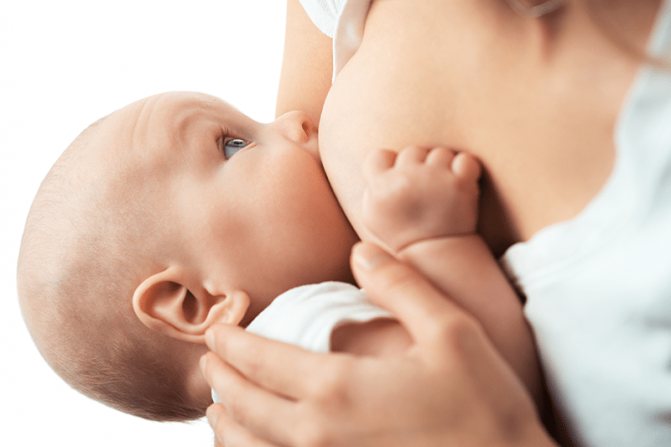
Try the following methods if your baby is suffering from hiccups, but one at a time:
- One of the simple ways to stop hiccups in a newborn is breastfeeding . Hiccups occur when the diaphragm becomes irritated. Drinking a small amount of breast milk and allowing it to flow slowly can cause the diaphragm to relax and return to normal movement;
- give the baby some sugar. It was a popular remedy for hiccups in ancient times. If your baby is old enough to eat solid food, place a few sugar crystals under his tongue. If he is too young to consume solids, you can dip the pacifier in some freshly prepared sugar syrup and place the pacifier in his mouth. Or dip your finger in the syrup and give it to your child.
Make sure the pacifier and finger are clean.Sugar will ease the tension in the diaphragm, thereby stopping the baby's hiccups;
- baby back massage.
This is a more direct way to relieve your newborn from hiccups. Place your child in an upright sitting position and gently rub in a circular motion on his back from the lower back to the shoulder. You can also place your baby on your stomach and do the same movements; Be gentle and don't apply too much pressure. The idea is to relieve tension in the diaphragm. - keep baby upright after feeding. Hold your baby upright for 15 minutes after feeding. Staying upright will keep the diaphragm in its natural position, preventing any muscle flutter. You can also gently rub his back to encourage him to burp, which will allow the air swallowed during feeding to escape. This will relax the diaphragm, thus reducing the chances of hiccups;
- distract the child. Every time your baby suffers from bouts of hiccups, try to distract him with a rattle. Hiccups are caused by muscle spasms, which can be caused by nerve impulses. Changing the neural stimuli through touch (such as a massage) or through some sensory input (observing a favorite toy) can reduce the frequency of a child's hiccups, if not stop them entirely;
- try dill water. There is no scientific evidence to support dill water for treating gastrointestinal problems in infants. However, it is one of the most popular solutions for treating stomach discomfort that has caused hiccups in babies. Check with your pediatrician before giving your child dill water.
You can try one or more of the above methods for hiccups. It is important to remember that in a state of increased anxiety, you can sometimes do things that will do more harm than good to the child. Therefore, control your emotions and evaluate your actions wisely.
How to prevent hiccups in children?
You can prevent your baby from getting hiccups by being careful with what he eats. According to many pediatricians, overfeeding is a common cause of hiccups in babies. Never feed your baby large quantities at one time, as this will cause severe distension of the stomach.
Keep the following points in mind when feeding a small baby:
- Feed your baby in small amounts over a longer period of time rather than filling his stomach in one sitting. This will help prevent overfeeding, which is a cause of hiccups in babies.
- Keep your baby upright when breastfeeding/bottle feeding at an angle of 35 - 45 degrees as this will ensure a smooth flow of milk through the esophagus.
- When your baby is old enough to sit, you can feed him in a sitting position. Position your baby with his back to you to support his back. Feeding while sitting will prevent air from being swallowed.
- Hear the sound your baby makes while feeding. If he is making too much noise, he is probably swallowing a lot of air. Adjust the pacifier in your mouth so that there is a small air gap in it. When breastfeeding, make sure your baby's mouth covers the entire nipple.
- Clean and wash your bottle regularly to prevent milk from collecting in the nipple. An obstruction during feeding can cause the baby to swallow more air than milk, causing hiccups.
- Never let your child sleep with a full bottle. Unlike the breast, where milk flows only when you suck, a bottle provides a constant flow of milk. Apart from being life-threatening and increasing the risk of tooth decay, it can also cause overfeeding, which in turn leads to hiccups.
Prevention
Since hiccups are not inherently a disease, there are no specific measures to prevent them. There are several recommendations for preventing conditions that can cause diaphragm spasms:
- After eating, hold the baby upright for 15 minutes;
- Allow the baby to burp freely after feeding. You can help this by gently stroking your back;
- Maintain the correct portion size and frequency of feedings, according to the child’s age and pediatrician’s recommendations;
- A nursing mother should choose and follow a diet that excludes foods that promote gas formation and contain large amounts of protein;
- Monitor the temperature of the child and the room in which he is located;
- Monitor the baby’s comfort: clothes should be dry and clean; for walks, the child should be dressed according to the weather, and should not be over-wrapped or, conversely, exposed;
- Carry out thorough cleaning in the baby’s room so that dust and other irritants do not enter the body;
- Eliminate factors that can lead to emotional shock (loud sounds, bright lights, strangers, pets (especially the appearance of a large dog’s face in front of a child’s face), and so on);
- Do not allow tobacco smoke to enter your child's lungs.
Hiccups are a fairly harmless condition that signals parents that there is some problem with the child. Most often, the problems are very minor, but they worsen the quality of life of the baby. It is important for moms and dads to notice the symptom in time and take measures to eliminate the causes of hiccups. If you can’t cope on your own, you shouldn’t delay visiting a pediatrician. Prolonged hiccups can lead to breathing problems, which can be a serious problem. You definitely can’t figure it out without the help of a doctor.
When a child hiccups, what should you not do?
There are certain hiccup remedies that are suitable for adults. Never try them on your babies, as getting rid of hiccups in a newborn can have adverse consequences.
- Never try to scare your newborn if they are hiccupping to get them to stop hiccupping. The loud bang of an exploding plastic bag, commonly used for hiccupping adults, can cause damage to infants' sensitive eardrums.
- Sour candies are great for adults, but are not intended for children. Even if your baby is over 12 months old, it is not recommended to feed him sour candy or other acidic foods to relieve hiccups. Most sour candies contain powdered edible acid, which may not be healthy for your baby.
- Don't slap your child too hard on the back. The ligaments in your baby's skeleton are still flexible, and any shock or brute force can cause serious damage to them. For this reason, never slap your baby hard on the back to prevent him from hiccupping. You can knock gently, but any excessive force may cause damage.
Hiccups in a child are a temporary nuisance. But if it repeats frequently, then it’s time to visit the doctor.
If the baby hiccups
Hiccups occur due to the contraction of the diaphragm, which closes the vocal cords and produces a hiccup sound when they close quickly. The diaphragm is a muscle that separates the abdomen from the chest, which, when tense, allows air into the lungs, and when relaxed, displaces it.
Causes of hiccups
Beginning in the second trimester of pregnancy, some women feel the fetus begin to pulsate evenly. Thus, fetal hiccups appear in the womb. This indicates the maturation of the baby’s central nervous system. There are several answers to the question of why a baby hiccups after every feeding .
- Immature diaphragm. In this case, it may contract unexpectedly and irregularly. But the baby grows, and by 3 months of life, the contractions of the diaphragm become more orderly and strong, as a result of which the attacks of hiccups become fewer and shorter.
- A large amount of food eaten. The stomach empties more slowly, irritating the diaphragm. The baby should not be overfed.
- Fast absorption of food. When a baby eats greedily, he swallows air along with the food, which leads to hiccups. You should give your baby a break for a few seconds so that he can burp excess air during feeding.
- Emotional condition. A child is easily startled by a loud sound or a sudden touch. And as a result of such emotional changes, the diaphragm may begin to contract.
- Response to microclimate changes. When exposed to cool air, babies often experience increased muscle tone. And due to the tension of the abdominal muscles, the stomach presses on the diaphragm, thereby causing hiccups.
- Non-compliance with diet by a nursing mother. Some foods are more likely to cause gas in babies. As a result, the stomach rises and the diaphragm is irritated, causing hiccups. Try to eat less food that increases gas formation.
- Allergic reaction. An allergy to a protein present in the baby’s diet, be it breast milk or an adapted formula. Inflammation occurs in the esophagus and, as a result, spasm of the diaphragm appears. Allergies to dust, fragrances, and fumes can cause coughing and hiccups.
Hiccups are very common in newborn babies. This is normal and parents should not be concerned about this condition.
It itself is harmless, but there are cases when hiccups are a sign of a serious illness:
- sometimes this is an indirect factor indicating the presence of cardiac pathologies;
- with spasm of the diaphragm, hiccups are observed with severe shortness of breath and loss of voice;
- irritation of the diaphragm by infection can cause frequent hiccups during pneumonia;
- A hiatal hernia causes frequent hiccups, but is also accompanied by other symptoms.
In such cases, bouts of hiccups occur frequently and last more than 30 minutes. Hiccups are persistent if they do not go away within two days.
How to help your baby
The main thing to do when a newborn hiccups is to relieve the tension on the diaphragm so that it returns to its normal state. You can rid your baby of hiccups in one of the following ways:
- Feeding and water. Try giving some breast milk or warm water (if your baby is formula-fed) to your newborn, just make sure the milk comes in slowly.
- Sugar consumption. This method almost instantly relieves unpleasant symptoms. Only sugar should be eaten dry and not washed down. This method is not suitable for very small children, but older children can dip the pacifier in sugar and offer to eat it. If the symptoms do not go away immediately, then the procedure must be repeated after two minutes.
- Water with sugar. You need to let your baby drink well-sweetened water.
- Stroking the back. This method will help relieve muscle tension and relax your baby. Using light circular movements, the hands move along the baby’s back from the lower back to the shoulder. In this case, the child should be either in a sitting position or lying on his stomach.
- Warm. Placing a warm diaper on the space between your baby's belly and chest will help him relax.
- Column position. You need to carry your baby upright for 20 minutes after feeding. This will allow the diaphragm to be in its normal position, and it will be easier for the baby to burp the air that he swallowed during feeding.
What not to do
There are different ways to rid an adult of hiccups. But do not try to apply them to newborn children:
- Don't scare your child when he hiccups.
- Do not slap the baby too hard on the back.
- Do not give sour candies, even if the child is over a year old.
When to contact a specialist?
- if it is gastroesophageal reflux. If a child constantly hiccups and always regurgitates a little liquid, we can assume the presence of gastroesophageal reflux. Gastroesophageal reflux is usually accompanied by other signs, including irritability, arching of the back, and crying a few minutes after feeding. If you suspect reflux, contact your pediatrician immediately;
- hiccups interfere with sleep and feeding. It is normal for a baby to hiccup from time to time, but if the hiccups are interfering with his daily activities such as eating, sleeping and playing, then you should take him to the doctor. When hiccups become chronic and interfere with daily activities, the baby automatically shows signs of discomfort. This means that hiccups may be caused by another cause that requires medical attention;
- when hiccups last for hours or days. Babies, including newborns, may hiccup almost daily for a few minutes or up to an hour. If they generally feel comfortable and happy, then there is no reason to worry. But if the hiccups show no signs of abating and continue for an abnormally long time, then the cause may be serious.
Observe whether your baby's hiccups are accompanied by an abnormal sound, such as wheezing. In such cases, be sure to consult your pediatrician.
Patience and observation will help you and your baby smile through the hiccups. Home remedies are simple methods to suppress and even prevent hiccups in your baby. Always remember that if your baby hiccups, it is completely normal and does not harm the baby. So never worry about it as it is a natural event. Some basic precautions during feeding will help manage your baby's hiccups. When hiccups are chronic, consult your pediatrician.
